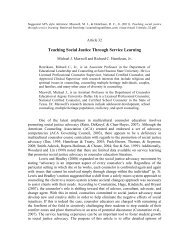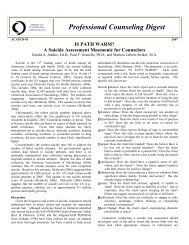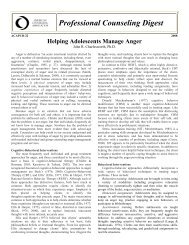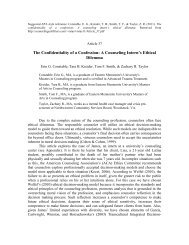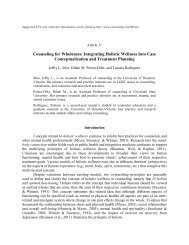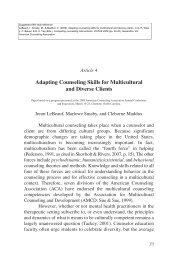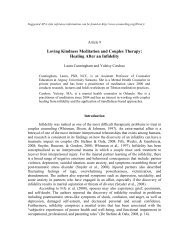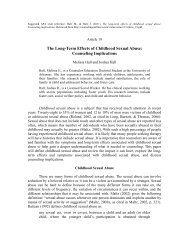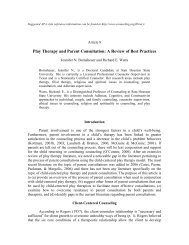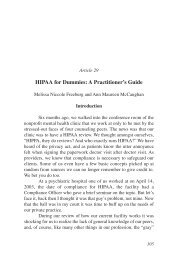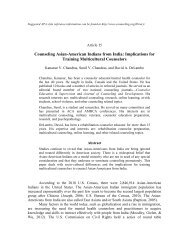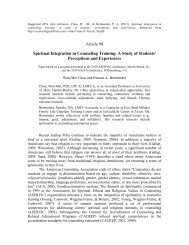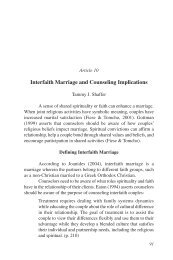Integrative Mental Health and Counseling - Counselingoutfitters.com
Integrative Mental Health and Counseling - Counselingoutfitters.com
Integrative Mental Health and Counseling - Counselingoutfitters.com
You also want an ePaper? Increase the reach of your titles
YUMPU automatically turns print PDFs into web optimized ePapers that Google loves.
Ideas <strong>and</strong> Research You Can Use: VISTAS 2011parsed out as a confound, may actually inform us that these phenomena (<strong>and</strong>consciousness specifically) may play a much larger role in health, healing, <strong>and</strong> wellnessthan was previously understood (Robb, 2006). In addition, Sternberg (2000) asserted thatif belief in healing <strong>and</strong> prayer help, although dismissed as placebo, perhaps the belief ispointing to actual physiological changes occurring in the body that have not yet beendetected or understood.<strong>Integrative</strong> <strong>Mental</strong> <strong>Health</strong> (IMH)The springboard for this paper emerged from a wellness <strong>and</strong> holistic model ofmental health, deemed by psychiatrist James Lake as <strong>Integrative</strong> <strong>Mental</strong> <strong>Health</strong> (Lake,2009). This approach addresses issues of wellness, spirituality, <strong>and</strong> cultural diversity. Itseeks to create a discussion regarding clinicians' experience with clients seeking IMH <strong>and</strong>how best to address these issues to provide optimal counseling to their clients. Lake‟sapproach involves a knowledge of the research on CAM treatments <strong>and</strong> assessing howbest to utilize these therapies to maximize treatment of mental disorders. It is a pragmatic<strong>and</strong> progressive approach in that it takes into consideration the energy system, the limitsof the research methodology, <strong>and</strong> the fact that there are real effects that may bechallenging to measure using the traditional scientific method (Lake, 2006). Lakeadvocates using the best CAM methods along with traditional therapy for particulardisorders, such as the herb kava, mindfulness practice, <strong>and</strong> cognitive therapy to treatgeneralized anxiety disorder (Lake, 2009). Beyond Lake‟s model, it seems that there areclinicians who have been utilizing these methods in various ways in recent years withoutneeding this label. However, it seems to be one of the first models to rigorously examinethe evidence <strong>and</strong> begin proposing mental health treatment protocols which organize thedisparate CAM treatments.The proposed model of IMH seems to provide many positive benefits in mentalhealth treatment <strong>and</strong> wellness promotion, as evidence is beginning to show that CAMtherapies help improve anxiety <strong>and</strong> depression (Kabat-Zinn et al., 1992; Miller, Fletcher,& Kabat-Zinn, 1995; Pilkington, 2010). This approach can be seen as a bridge tocounseling from integrative medicine as Lake writes from a psychiatric perspective.Since psychiatry, social work, psychology, <strong>and</strong> counseling all treat mental disorders, it isre<strong>com</strong>mended that counselors take up the call to engage this emerging paradigm sooner,rather than later. This seems to be a natural fit for the field of counseling as it st<strong>and</strong>s as aprogressive, advocating, holistic force in the large arena of mental health (Gale & Austin,2003; Ponton & Duba, 2009).Clinical Implications <strong>and</strong> ApplicationsAs increasing numbers of clients enter the counseling office with an adjunctiveCAM therapy, it will be<strong>com</strong>e imperative for counselors to engage with the research onthese therapies, their impact on mental health treatment, <strong>and</strong> how to decide tointentionally engage the integrative practitioner in a team treatment approach. It iscurrently hypothesized that team treatment may be indicated for <strong>com</strong>plex conditionswhich include mental health (Boon, Verhoef, O‟Hara, & Findlay, 2004). In addition, thismaterial could also be useful for faculty who teach counseling theory <strong>and</strong> practice or6



